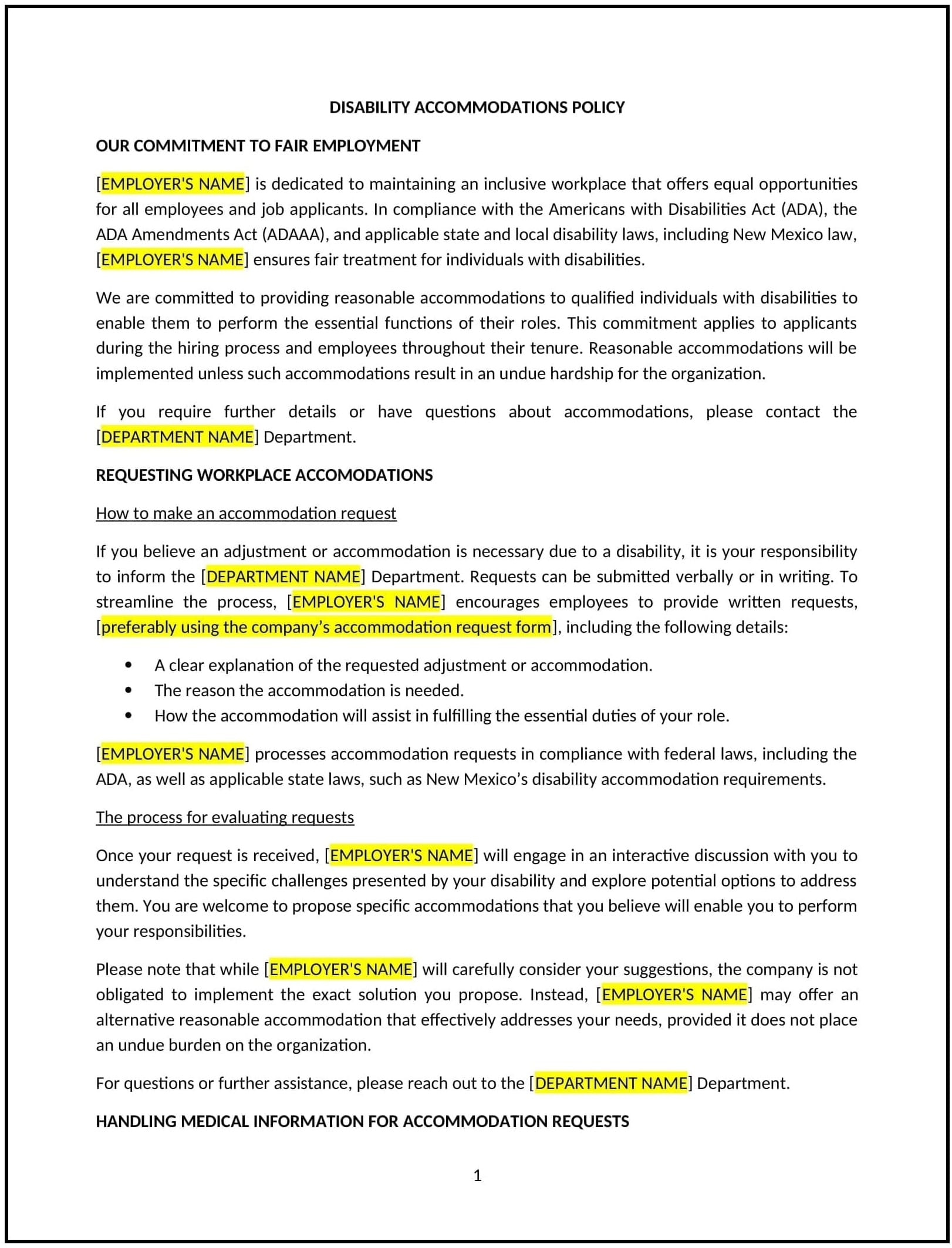Disability accommodations policy (New Mexico): Free template
Got contracts to review? While you're here for policies, let Cobrief make contract review effortless—start your free review now.

Customize this template for free
Disability accommodations policy (New Mexico)
This disability accommodations policy is designed to help New Mexico businesses support employees with disabilities by providing reasonable accommodations to ensure they can perform their essential job functions. The policy outlines how employees can request accommodations, what types of accommodations may be offered, and the process for reviewing and implementing accommodations.
By adopting this policy, New Mexico businesses can create an inclusive workplace, support employee well-being, and comply with both federal and state regulations regarding disability accommodations.
How to use this disability accommodations policy (New Mexico)
- Define disability and accommodation: Clearly define what constitutes a disability under the policy, referencing both physical and mental impairments that substantially limit one or more major life activities. Explain what constitutes a "reasonable accommodation" and provide examples relevant to the workplace.
- Set the process for requesting accommodations: Outline the steps employees must follow to request accommodations, including who they should contact (e.g., HR, direct supervisor), any documentation required, and the timeline for requesting accommodations.
- Assess accommodation requests: Explain how the business will review accommodation requests, taking into account the nature of the employee’s disability, the impact on their job performance, and the company’s ability to provide the requested accommodation.
- Determine the appropriate accommodations: Specify the types of accommodations that may be considered reasonable, such as modifications to the workspace, flexible work hours, or assistive technologies.
- Address the interactive process: Highlight the need for an interactive dialogue between the employee and the business to explore potential accommodations and find mutually agreeable solutions.
- Reflect New Mexico-specific considerations: Incorporate any state-specific laws, regulations, or guidelines that may impact disability accommodations in New Mexico, such as additional protections under the New Mexico Human Rights Act.
Benefits of using this disability accommodations policy (New Mexico)
Implementing this policy provides New Mexico businesses with several advantages:
- Promotes an inclusive workplace: Providing accommodations helps create a more inclusive and supportive work environment for employees with disabilities, leading to higher morale and engagement.
- Enhances employee retention: By offering reasonable accommodations, businesses can retain talented employees who might otherwise be unable to perform their duties, reducing turnover and the cost of recruitment.
- Reduces legal risks: A clear policy helps ensure compliance with both federal and New Mexico state disability discrimination laws, reducing the risk of legal challenges or claims.
- Increases productivity: By addressing barriers to performing essential job functions, accommodations enable employees to perform at their best, improving overall productivity.
- Strengthens company reputation: Businesses that are known for their commitment to diversity and inclusion build a positive reputation, attracting top talent and customers who value ethical practices.
Tips for using this disability accommodations policy (New Mexico)
- Communicate the policy clearly: Ensure that all employees are aware of the disability accommodations policy and know how to request accommodations when needed. Include the policy in employee handbooks and make it easily accessible.
- Provide training: Offer training to HR personnel, managers, and supervisors on how to handle accommodation requests fairly and confidentially. This helps ensure that all employees receive the support they need without stigma or discrimination.
- Be proactive in offering accommodations: If the business becomes aware of a potential disability, it should proactively engage with the employee to explore accommodation options, rather than waiting for the employee to initiate the request.
- Keep documentation confidential: Ensure that any medical or disability-related information is kept confidential and shared only with those who need to know in order to facilitate accommodations.
- Review the policy regularly: Periodically review and update the disability accommodations policy to ensure it is in line with New Mexico state laws, federal regulations, and evolving business needs.